A new report from a British activist group is placing Thailand’s fishing industry in some pretty hot water, with allegations that 15 Burmese workers of a Thai crew were basically slaves. The group is now urging the United States, which is the No. 1 importer of Thai fish products, to hold Thailand accountable for the reported abuses the workers suffered at the hands of the fishing crew. [More]
seafood
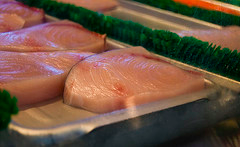
Report: Thai Fishing Industry Is Using Slave Labor To Catch The Fish Imported By The U.S.
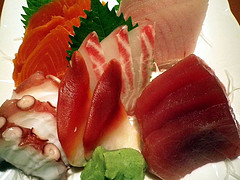
Study: 33% Of Seafood Nationwide Is Mislabeled; Red Snapper Impostors Prevalent
After releasing smaller parts of its study regarding New York City and other parts of the country, conservation group Oceana has published its full report on the seafood industry’s labeling problems nationwide, and it ain’t pretty. The two-year study investigated seafood fraud, using more than 1,200 seafood samples from 674 retail locations in 21 states to see if they were labeled correctly. About a third of the time, they weren’t. [More]
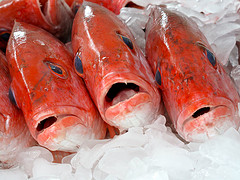
Study Finds A Third Of NYC’s Seafood Is Mislabeled, Posing Health Risks
It isn’t just Los Angeles that is having a problem with mislabeled fish — a new study that tested seafood on menus, at grocery stores and in fancy specialty shops in New York City says plenty of the fish offerings there are frequently misidentified. So while you might think you’re ordering up a nice slab of red snapper, it could just be a regular old piece of tialpia. That kind of mislabeling and misrepresentation could also lead to plenty of health problems, say researchers. [More]
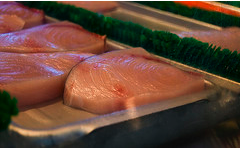
L.A. Seafood Task Force’s Catch Of The Day Features Lots Of Mislabeled Fish
What you see is apparently not always what you’re getting in L.A., says a county Seafood Task Force that took on the problem of mislabeled fish in the food industry. The group found that a whole slew of issues that were widespread across supermarkets and restaurants alike that could pose health problems for consumers. [More]
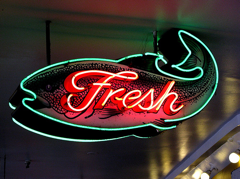
Don't Mind Pictures Of Icky Fish: FDA Declares Gulf Seafood Safe To Eat
Despite photos of fish with sores or other unappetizing marks on them from the Gulf of Mexico, the Food and Drug Administration’s Gulf Coast Seafood Laboratory says seafood is safe to eat, two years after the BP oil spill. [More]
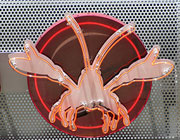
Man Arrested At Winn-Dixie With Lobster, Shrimp, And Pork Down His Pants
If you’re going to shoplift two lobster tails, two bags of shrimp, and a pork loin from a grocery store, what’s the least obvious way to do so? Shove them in your shorts, of course. A MIssissippi man is accused of shoplifting after allegedly doing just that. [More]
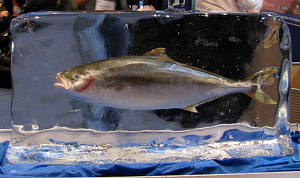
Investigation Reveals Widespread Fraud In Seafood Packaging
It’s a common, legal practice to protect seafood with a layer of ice before packaging it up for retail sale. It’s also apparently a common practice to add that ice into the total weight of the seafood, and in some cases to add more ice than necessary just to bump up the total weight, which isn’t legal and which defrauds the consumer. The National Conference on Weights and Measures recently investigated seafood packaging in 17 states and pulled more than 21,000 packages of seafood from store shelves, noting that in one particularly bad case ice made up 40% of the total listed weight. [More]
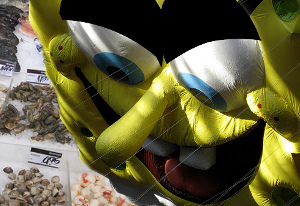
Customer Punches Grocery Store Manager Over Price Of Crab Cakes
A man in Sandusky, Ohio, grew so angry at the price of some crab cakes that he punched the store manager “five or six times,” head butted him, and spit in his face. According to the Associated Press article, there was a pricing error in the customer’s favor, and the manager had offered to give the customer the first crab cake at the incorrect price but wanted to charge full price for the rest. [More]
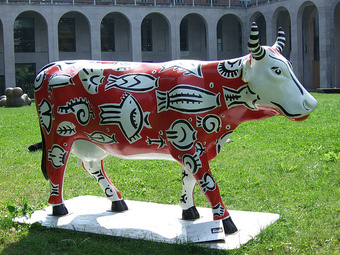
Now In Farmed Fish: Mad Cow Disease?!
Three scientists worry that feeding cow parts to farmed fish could expose seafood consumers to mad cow disease. The scientists published their findings in the Journal of Alzheimer’s Disease and called on the government to ban cow meat and bone meal from appearing in fish feed.
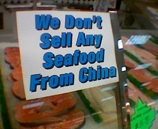
Use Free Trade To Promote Food Safety
National Journal has an interesting article about the intersection of free trade and globalization with increased food safety abroad and at home. Rather than reject shipments of Chinese fish for being raised in disgusting environments, the US should require trading partners to set and enforce their own strict food safety standards and use globalization as a way to promote better standards worldwide, instead of a race to the bottom.

"Langostino Lobster" More Closely Related To Hermit Crab Than To Lobster
If you see the word “langostino” in front of “lobster” at your local seafood fast food chain (*cough* Long John Silvers), make sure you understand what it is you’re about to eat. In the US, langostino can refer to squat lobster, pelagic crab or Colorado langostino—all types of shellfish, and more closely related to crabs and, yes, hermit crabs than to lobsters. “Sweet Buttery Hermit Handfuls” wouldn’t be any more accurate than “Buttered Langostino Lobster Bites,” but it wouldn’t be any less accurate, either. And no, LJS, it doesn’t count if you put the shellfish pieces in a cardboard lobster tail.
../../../..//2009/01/19/please-do-not-eat-the/
Please do not eat the lobster, then glue the shell back together and return it for a refund. [Times Union Albany] [Thanks to Laurie & Brian!]
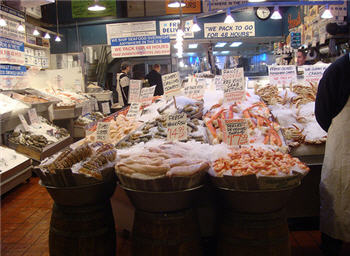
Recession Bargain: Lobsters Are Cheap, Cheap, Cheap
The New York Times says that due to the recession there is a glut of available lobster, which is driving down prices.
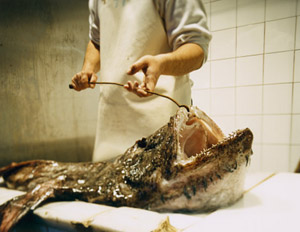
8 Tips For Fish Shopping
If you grew up in a landlocked area like this author did—or you’re just not a foodie at heart—odds are you’re a bit clueless when it comes to fish shopping. Alton Brown of the Food Network offers some quick advice on how to find the best fish the next time you go to the market.
FDA Ban Fails To Catch 1 Million Pounds Of Chinese Seafood
1 million pounds of shrimp, eel, and catfish somehow slipped past the FDA’s ban on Chinese seafood. All seafood covered by the ban arrives at U.S. ports under an import alert, which ostensibly prevents the fish from leaving until private testing proves the absence of banned antibiotics and drugs. Chinese importers, resorting to tricks possibly gleaned from Wile E. Coyote, evade the FDA by shipping their contraband under the names and addresses of companies unaffected by the import alert. From the AP:
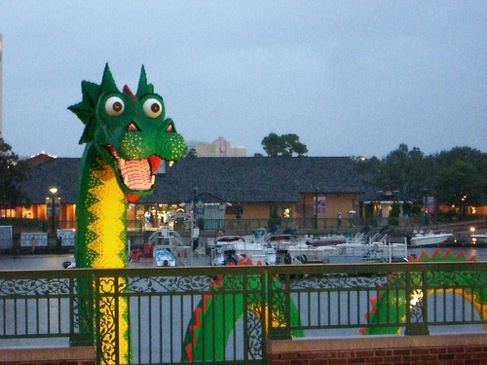
FDA Bans Import Of Chinese Seafood
The FDA is detaining all farm-raised catfish, basa, shrimp, dace, and eel from China over concerns that the fish may be on drugs. Tests since last October repeatedly revealed the presence nitrofuran, malachite green, and gentian violet – antibiotics that are not approved for human consumption in the United States. Though no general recall has been issued, the “FDA is concerned about long term exposure as well as the possible development of antibiotic resistance.” Chinese Commerce Ministry spokesman Wang Xinpei responded in classic form, saying:



